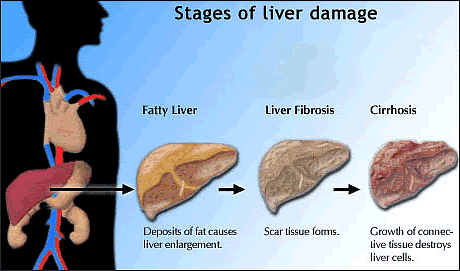Over years
or decades, chronic hepatitis B virus
(HBV) infection can progress to advanced liver disease including
cirrhosis and hepatocellular
carcinoma. Compensated cirrhosis means the liver is heavily damaged
but can still carry out its normal functions; decompensated cirrhosis
occurs when the liver is no longer able to perform it critical functions.

Antiviral
agents that suppress HBV can prevent or slow liver disease progression,
and people with decompensated cirrhosis therefore stand to benefit greatly
from effective treatment. But these drugs can cause side effects that
patients with severe illness may be unable to tolerate.
A.K. Singal from the University of Texas Medical Branch and R.J. Fontana
from the University of Michigan at Ann Arbor performed a systematic
review of English language medical literature published between 1995
and 2010, looking for studies that evaluated the effectiveness and safety
of oral antiviral agents for people with decompensated HBV cirrhosis
(defined as a CTP score > 7). Studies were graded for quality
on a scale of 0-10.
The researchers identified 21 relevant studies with a quality score
> 5, including 13 looking at lamivudine
(Epivir-HBV), 3 looking at adefovir
(Hepsera) in lamivudine-resistant patients, and 5 looking at entecavir.
They extracted 1-year efficacy and safety data for patients treated
for more than 6 months, and calculated odds ratios (OR) for controlled
studies and pooled proportions for open studies.
Results
 |
Pooled
data on 6 controlled studies showed that patients taking lamivudine
(n = 920) did better than control subjects (n = 1237) with regard
to: |
| |
 |
Undetectable
HBV DNA: OR 148; |
 |
ALT
normalization: OR 76; |
 |
CTP
score decrease of at least 2 points: OR 9.2; |
 |
Development
of hepatocellular carcinoma: OR 0.36; |
 |
Liver
transplantation: OR 0.33. |
|
 |
Patient
survival was similar, however, and 22% of lamivudine recipients
developed lamivudine resistance. |
 |
Patients
taking adefovir and those taking lamivudine had similar survival,
but adefovir recipients were much less likely to develop resistance
(1.5%). |
 |
Adefovir
potency was lower than that of lamivudine, however, with only 57%
of patients achieving undetectable HBV DNA and 67% achieving normal
ALT. |
 |
Entecavir
showed higher efficacy, similar to that of lamivudine, but with
0% resistance. |
 |
All
3 drugs were safe, without serious adverse events except for kidney
insufficiency in < 1% of patients (2 of 226) taking adefovir
in 1 study. |
 |
1
small randomized clinical trial found that entecavir had better
efficacy than lamivudine with regard to undetectable HBV DNA (100%
vs 72%) at 1 year. |
Based on
these findings, the researchers concluded, "Oral agents are effective
and safe for treating decompensated HBV cirrhosis."
"Lamivudine is limited by resistance at 1 year and adefovir is
limited by potency," they continued. "Entecavir has advantages
of potency without resistance in treatment-naive patients."
The investigators acknowledged that comparative studies of newer potent
agents with low resistance -- for example entecavir vs tenofovir --
are needed to determine optimal treatment for hepatitis B patients with
decompensated cirrhosis.
A study
published earlier this year showed that entecavir improved liver
function in people with decompensated cirrhosis, and in October the
drug was approved
for this indication.
Like adefovir, tenofovir carries a small risk of kidney toxicity, a
concern because many people with decompensated cirrhosis already have
some degree of kidney impairment. A study
presented at last year's AASLD meeting, however, showed that tenofovir
-- especially when combined with emtricitabine
(Emtriva) -- was effective and well-tolerated in this population.
Telbivudine
(Tyzeka) has also
demonstrated good results in hepatitis B patients with decompensated
liver disease.
Investigator affiliations: Gastroenterology, University of Texas
Medical Branch, Galveston, TX; Gastroenterology and Hepatology, University
of Michigan, Ann Arbor, MI.
11/16/10
Reference
AK Singal and RJ Fontana. A systematic review of oral antiviral agents
in decompensated HBV cirrhosis. 61st Annual Meeting of the American
Association for the Study of Liver Diseases (AASLD 2010). Boston, October
29-November 2, 2010. Abstract
375.